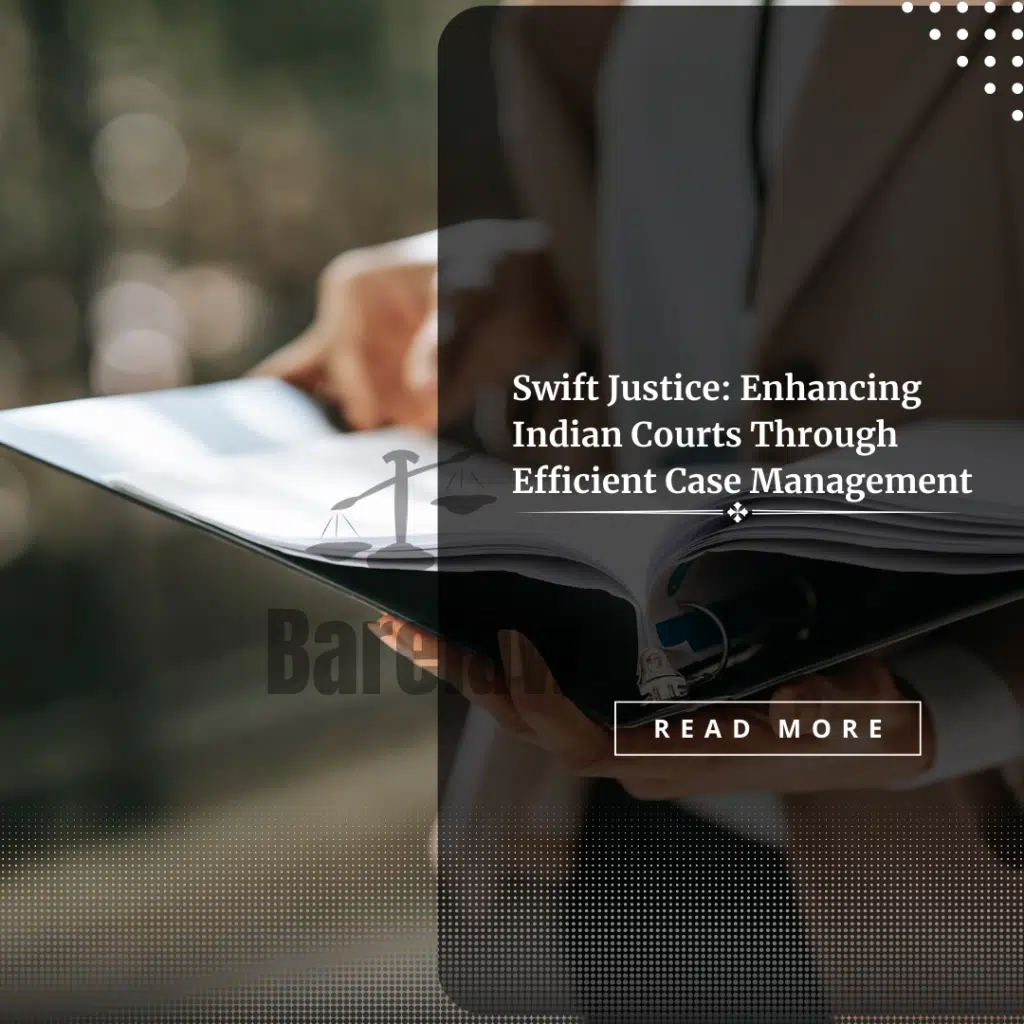
Table of Contents
Swift Justice: Enhancing Indian Courts Through Efficient Case Management
Swift Justice: Enhancing Indian Courts Through Efficient Case Management
The Indian judiciary, among many others, has been facing the problem of huge backlog and delayed justice. The need for efficient case management as a solution to this issue cannot be overemphasized. This paper examines the importance of streamlined case management in reducing judicial backlogs and ensuring timely delivery of justice in Indian courts while also suggesting some best practices and innovative approaches towards achieving these goals.
The Importance of Efficient Case Management:
Proper case management is the foundation of any well-functioning legal system. It entails prudent distribution of judicial resources, efficient scheduling and proactive handling of cases so as to avoid unnecessary delays. In countries like India where there are massive numbers of pending cases before various courts; such an approach becomes vital in guaranteeing that all citizens have access to justice.
Reducing Judicial Backlog:
The problem of overwhelming caseloads leading to lengthy trials that erode public confidence can be solved by adopting certain measures aimed at cutting down on pretrial proceedings which consume much time without adding substantial value into a case but instead serve only to frustrate parties involved or their counsels. One way is through prioritizing them according their urgency levels while expediting procedural steps taken during hearing process as well identifying those which can be settled outside court through alternative dispute resolution mechanisms.Any other matter should follow suit if efficient management practices were put in place by our courts hence they will move quickly disposed off within reasonable periods.
Ensuring Timely Justice Delivery:
Efficient trial dates allotment ensures individuals’ rights are safeguarded since it guarantees that minimum resources are wasted throughout litigation period . Delays occasioned by our current legal systems often deny people access to remedies thereby affecting negatively on their lives.Justice must therefore be done without any further delay than necessary so long as it meets required standards thus quick trial disposal through effective case management should always remain top priority among judges presiding over these matters within country like India.Supreme Court can play important role here too by setting targets for lower courts to meet in regard this.
Best Practices for Efficient Case Management:
- Case Categorization: This is where different categories or types cases should be handled differently based on their complexity levels so as they may not consume much time than expected which would have been used to handle other cases..For instance, vulnerable people should have their matters given priority over routine ones hence fast tracking mechanisms being put place while still adhering standard procedures.
- Technology Integration: Use modern technological advancements like electronic filing systems (e-filing), virtual hearings apart from case tracking ensure smooth running throughout court processes thus reducing unnecessary paper work plus promoting transparency at large.
- Judicial Training: Judges and court staff can benefit from specialized training programs on various techniques related with effective management of cases such as negotiation skills, mediation among others which will equip them adequately to deal with these matters whenever they arise within society more especially when it comes matters involving business entities where time factor always plays crucial role during adjudication process.
- Early Case Assessment: Courts ought to identify any potential challenges that may hinder quick resolution at an early stage before too many adjournments cause delays so this calls for proactive approaches towards resolving such problems without adjourning unnecessarily.
Innovative Approaches:
- Pre-Trial Conferences: Parties involved meet prior hearing date discuss all procedural issues before judge thereby speeding up preparation for trial .
- Alternative Dispute Resolution (ADR): Promote faster resolution disputes through mediation or arbitration instead formal court system because it helps save costs both financially speaking as well emotionally since parties get chance tell their stories freely without fear being judged harshly by others including judges themselves who might not understand fully what happened between two conflicting groups which led one them seeking justice against another party involved in dispute .
- Online Dispute Resolution (ODR): Establish online platforms facilitate settling differences between individuals living far apart without necessarily having go physical courts thus reducing congestion within these institutions besides saving time for other important matters.
- Case Flow Management: Assign judges handle cases from beginning end so as achieve consistency in decision making process hence creating smooth flow throughout various stages involved until final determination reached which ensures fairness .
Conclusion:
Effective administration of cases is the main factor that can convert the Indian justice system into a more efficient and answerable body. The courts in India can reduce their backlog and ensure timely justice for all by giving priority to various lawsuits, utilizing technology as well as adopting creative methods. These joint actions would establish an organized legal structure which is readily available thus affirming the fundamental rights of every individual to fairness before law.



